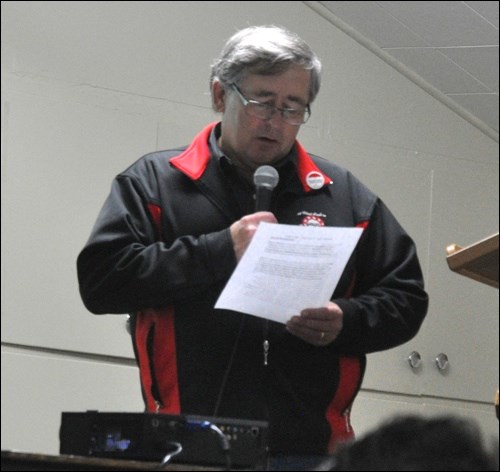A group gathered last week for a town hall meeting on privatization in health care were warned funding cuts were on the way – and that warning has materialized.
The warning came from president of the Canadian Union of Public Employees Local 5111, Brian Manegre. He told about 30 people attending the Battleford stop on a Council of Canadians provincial tour that, in addition to privatization, the main topic of the meeting, budget cuts threaten the quality health care.
Rumour had it that Prairie North Health Region was being directed to find $650,000 in savings in the current budget, said Manegre.
"Less than three months ago, I had a meeting with the CEO, the budget was set and we were going to have a balanced budget with no cuts," he said. "They actually going to increase staffing in a few areas and things were looking better for Prairie North."
He was expecting confirmation of the rumour in a meeting with the health region that coming Friday.
This week, Manegre told the Regional Optimist, "I was correct that the government has reduced our funding and that Prairie North is going to have to find some dollars or some savings in order to make a balanced budget."
He said, "CUPE has agreed that we would work with them where we can to try and meet the needs of the region and clients and see where we can find efficiencies together."
Manegre points out CUPE, the region and the government are partners in an agreement signed approximately a year ago to share a commitment to patient-first care and health system transformation.
"With our last round of bargaining, CUPE along with [five] regions and the government signed a partnership agreement and in that we committed to more open discussions within the region and to try and work together, rather than a typical union employer roles that have been happening in the past," he said.
The aim is to work together on finding efficiencies and to discuss issues rather than just argue over them, he said.
"We'll see what can jointly come up with and where we can support each other," said Manegre. "The union has agreed that we would support some basic statements out there to our members that we agree with the employer we need to find the efficiencies. We need the members' support to meet these needs."
For now, he said, the good news is CEO David Fan has indicated there are no plans for layoffs or reductions in beds at this time. He expects, however that there may be vacancies that will now not be filled, given the government's timing of reducing funding midstream in the budget.
"There are probably a number of vacancies we will see not filled for the next period of time, but I have no idea which ones those will be."
Manegre also said, "This is the first that I've ever heard of that, in the middle of the year, the budget has been reduced. I'm sure other government agencies are doing the same. With our downturn in the economy, my understanding is potash and oil revenues are really in the tank right now so that's a big impact, and the fires up north were a big impact on government revenue. Those are some of the issues I've heard from the government … so they are looking at whatever else we can do to reduce spending."
One of the issues he expects to address with the region in upcoming meetings is that of overtime, which has been a concern to the province and its health regions for some years, prompted by a shortage of staff.
Manegre would like to see more relief staff hired, as overtime shifts often accumulate because short-staffed departments run out of available relief workers. He admits recruitment is a problem, especially for highly-skilled personnel, but he has some ideas to offer in that area.
While Manegre expects working with the region to meet the challenges of reduced funding will find ways to meet the current crisis, he sees no guarantees that next year won't bring yet another.
"If the oil and the potash doesn't come back up I don't know what the government is going to do with health care in the [next] budget," he says. "It raises more concerns for me again."
Manegre says he is happy that at this point in time the health region does not want resort to layoffs or reduce any beds.
"Prairie North hasn't done that since we became Prairie North, actually," he points out.
The last big shut down came just after the Fyke Commission on Medicare, 2001, came out, he says.
"They shut down the nursing home in Paradise Hill … there was a large number of layoffs there and a big impact on the community and we don't want to go there again."
He says Prairie North has had only limited reductions since then, and has been able to balance the budget.
"I feel very lucky in many ways in this region. We haven't really run a deficit budget ever," he says. "David has done very well in keeping things on track and actually having some surpluses in the past and that's gone a long way in upgrading our buildings … and doing some innovative work at times."
At this point, he says, the best news is that CUPE is committed to work with the region where it can.
"Hopefully we can get on a little different footing and work through some issues and help out."
He adds, "There is a considerable amount of money that is required to be saved in health care in the province, period. Prairie North? We are probably one of the luckier areas, but we're also not the biggest region. Saskatoon and Regina are big regions and they're definitely having more struggles than we are."




